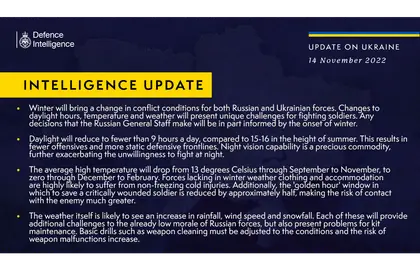- Winter will bring a change in conflict conditions for both Russian and Ukrainian forces. Changes to daylight hours, temperature and weather will present unique challenges for fighting soldiers.
- Any decisions that the Russian General Staff make will be in part informed by the onset of winter.
- Daylight will reduce to fewer than 9 hours a day, compared to 15-16 in the height of summer. This results in fewer offensives and more static defensive frontlines.
- Night vision capability is a precious commodity, further exacerbating the unwillingness to fight at night.
- The average high temperature will drop from 13 degrees Celsius through September to November, to zero through December to February. Forces lacking in winter weather clothing and accommodation are highly likely to suffer from non-freezing cold injuries.
- Additionally, the ‘golden hour’ window in which to save a critically wounded soldier is reduced by approximately half, making the risk of contact with the enemy much greater.
- The weather itself is likely to see an increase in rainfall, wind speed and snowfall. Each of these will provide additional challenges to the already low morale of Russian forces, but also present problems for kit maintenance.
- Basic drills such as weapon cleaning must be adjusted to the conditions and the risk of weapon malfunctions increase.
To suggest a correction or clarification, write to us here
You can also highlight the text and press Ctrl + Enter
You can also highlight the text and press Ctrl + Enter







